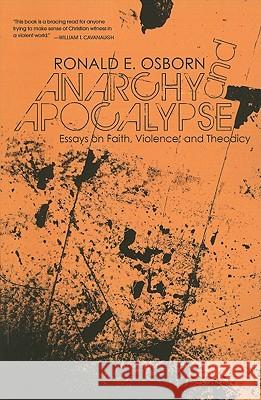Anarchy and Apocalypse: Essays on Faith, Violence, and Theodicy » książka
Anarchy and Apocalypse: Essays on Faith, Violence, and Theodicy
ISBN-13: 9781606089620 / Angielski / Miękka / 2010 / 176 str.
Anarchy and Apocalypse: Essays on Faith, Violence, and Theodicy
ISBN-13: 9781606089620 / Angielski / Miękka / 2010 / 176 str.
(netto: 88,08 VAT: 5%)
Najniższa cena z 30 dni: 91,22
ok. 16-18 dni roboczych.
Darmowa dostawa!
Description: In this wide-ranging collection of essays Ronald E. Osborn explores the politically subversive and nonviolent anarchist dimensions of Christian discipleship in response to dilemmas of power, suffering, and war. Essays engage texts and thinkers from Homer's Iliad, the Hebrew Bible, and the New Testament to portraits of Dietrich Bonhoeffer, Noam Chomsky, and Elie Wiesel. This book also analyzes the Allied bombing of civilians in World War II, the peculiar contribution of the Seventh-day Adventist apocalyptic imagination to Christian social ethics, and the role of deceptive language in the Vietnam War. From these and other diverse angles, Osborn builds the case for a more prophetic witness in the face of the violence of the ""principalities and powers"" in the modern world. This book will serve as an indispensible primer in the political theology of the Adventist tradition, as well as a significant contribution to radical Christian thought in biblical, historical, and literary perspectives. Endorsements: ""In reading Osborn you cannot help but think, 'He has to be kidding. He has to be putting us on to suggest there is a connection between anarchy and that form of Christianity called Adventist.' But he is not kidding. Rather he has written a book of lively essays to remind us that a commitment to peace is a challenge to any order based on violence. It was the Adventists, in their early formations, who reminded us that a commitment to peace cannot avoid challenging orders based on violence; that peace requires a different kind of order altogether. This is a call to the church to be that community based on the order of Christ's peace."" --Stanley Hauerwas author of Christianity, Democracy, and the Radical Ordinary ""This book is a bracing read for anyone trying to make sense of Christian witness in a violent world. Osborn ranges both widely and deeply, connecting insights from theology, history, literature, and political science in startling and inventive ways. He shows how violence creates its own momentum, and offers a wide range of resources for countering that momentum. Anyone interested in living creatively in a destructive world will benefit from this book. It is the kind of book that has the power to transform lives."" --William T. Cavanaugh author of The Myth of Religious Violence ""The Christianity of the American Empire has not only come to accept the normalization of violence; it often celebrates it How desperately American Christians need the keen insights regarding the demonic dynamics of power and violence that Ronald Osborn reflects in these essays "" --Greg Boyd author of The Myth of a Christian Nation About the Contributor(s): Ronald E. Osborn is a Bannermen Fellow with the Program in Politics and International Relations, University of Southern California
Description:In this wide-ranging collection of essays Ronald E. Osborn explores the politically subversive and nonviolent anarchist dimensions of Christian discipleship in response to dilemmas of power, suffering, and war. Essays engage texts and thinkers from Homers Iliad, the Hebrew Bible, and the New Testament to portraits of Dietrich Bonhoeffer, Noam Chomsky, and Elie Wiesel. This book also analyzes the Allied bombing of civilians in World War II, the peculiar contribution of the Seventh-day Adventist apocalyptic imagination to Christian social ethics, and the role of deceptive language in the Vietnam War. From these and other diverse angles, Osborn builds the case for a more prophetic witness in the face of the violence of the ""principalities and powers"" in the modern world. This book will serve as an indispensible primer in the political theology of the Adventist tradition, as well as a significant contribution to radical Christian thought in biblical, historical, and literary perspectives.Endorsements:""In reading Osborn you cannot help but think, He has to be kidding. He has to be putting us on to suggest there is a connection between anarchy and that form of Christianity called Adventist. But he is not kidding. Rather he has written a book of lively essays to remind us that a commitment to peace is a challenge to any order based on violence. It was the Adventists, in their early formations, who reminded us that a commitment to peace cannot avoid challenging orders based on violence; that peace requires a different kind of order altogether. This is a call to the church to be that community based on the order of Christs peace.""--Stanley Hauerwasauthor of Christianity, Democracy, and the Radical Ordinary""This book is a bracing read for anyone trying to make sense of Christian witness in a violent world. Osborn ranges both widely and deeply, connecting insights from theology, history, literature, and political science in startling and inventive ways. He shows how violence creates its own momentum, and offers a wide range of resources for countering that momentum. Anyone interested in living creatively in a destructive world will benefit from this book. It is the kind of book that has the power to transform lives.""--William T. Cavanaughauthor of The Myth of Religious Violence""The Christianity of the American Empire has not only come to accept the normalization of violence; it often celebrates it! How desperately American Christians need the keen insights regarding the demonic dynamics of power and violence that Ronald Osborn reflects in these essays!""--Greg Boydauthor of The Myth of a Christian NationAbout the Contributor(s):Ronald E. Osborn is a Bannermen Fellow with the Program in Politics and International Relations, University of Southern California











